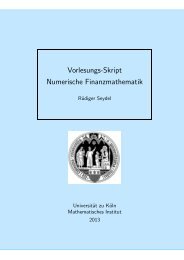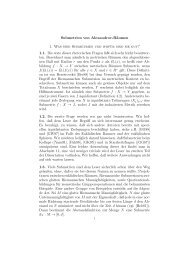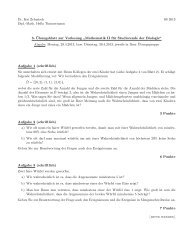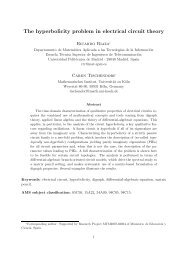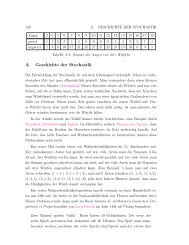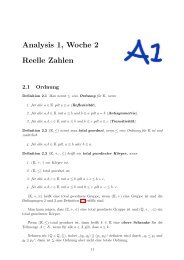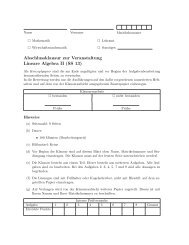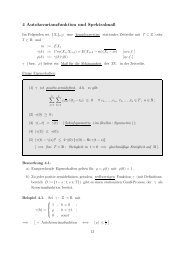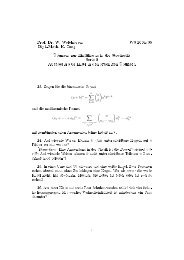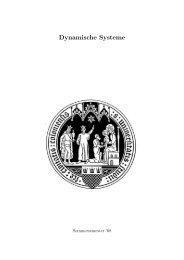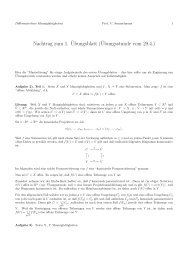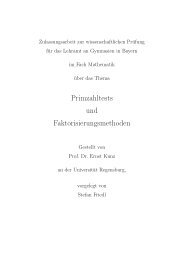Inhaltsverzeichnis - Mathematisches Institut der Universität zu Köln
Inhaltsverzeichnis - Mathematisches Institut der Universität zu Köln
Inhaltsverzeichnis - Mathematisches Institut der Universität zu Köln
Create successful ePaper yourself
Turn your PDF publications into a flip-book with our unique Google optimized e-Paper software.
DMV Tagung 2011 - <strong>Köln</strong>, 19. - 22. September<br />
Flavius Guia¸s<br />
TU Dortmund<br />
A time-adaptive numerical scheme for evolution partial differential equations based on path<br />
simulation of Markov jump processes<br />
We present a new general scheme of stochastic type for approximating ordinary differential equations,<br />
which turns out to be efficient especially for spatially discretized partial differential equations. It is a further<br />
development of the method introduced in Guia¸s (2010) which is based on the direct simulation of paths<br />
of suitable Markov jump processes. This initial explicit scheme turns out to be stable even on non-uniform<br />
grids. In this talk we present the results of exploiting further the full path simulation and improve the<br />
convergence or<strong>der</strong> by performing periodically Picard iterations and/or Runge-Kutta steps based on the<br />
computed trajectories. We apply the method on a model problem where a very precise time resolution is<br />
needed (a reaction-diffusion PDE which exhibits steep and fast traveling fronts) and its efficiency turns<br />
out to be superior to standard deterministic methods. We use cartesian grids in 1D and 2D and also<br />
moving grids for the 1D problem. The mathematical algorithm behind this scheme is simple and flexible<br />
and can be formulated for general evolution partial differential equations. The main challenge in improving<br />
the efficiency of the method is shifted towards an optimal ’tuning’ and to implementation aspects such as<br />
sampling, data structures and computational features. By taking the mean over several independent paths<br />
this scheme is also suitable for using the facilities of parallel computing.<br />
Literatur<br />
Guia¸s, F. (2010). Direct simulation of the infinitesimal dynamics of semi-discrete approximations for<br />
convection-diffusion-reaction problems Math. Comput. Simulation, 81, 820 - 836.<br />
Guia¸s, F., Eremeev, P. (2011). A time-adaptive numerical scheme for evolution partial differential equations<br />
based on path simulation of Markov jump processes (submitted)<br />
Lennart Jansen<br />
<strong>Universität</strong> <strong>zu</strong> <strong>Köln</strong><br />
Semiexplicit methods for differential-algebraic equations<br />
By their definition differential-algebraic equations (DAEs) are a mixture of differential and algebraic equations.<br />
With the help of projector functions the solutions of a DAE can also be seperated into a differential<br />
and an algebraic part.<br />
In the case of an ordinary differential equation (ODE) the whole solution belongs to the differential part.<br />
Therefore an ODE can be solved with explicit solver methods which may lead to a reduction of the calculation<br />
time, because an explicit method does not need to solve a non-linear system in every time step, in<br />
contrast to an implicit method.<br />
With the seperation of the solution into differential and algebraic parts, it is possible to formulate an explicit<br />
method on the differential solution parts while solving the algebraic ones with an implicit method. For this<br />
reason in every time step one has only to solve a non-linear system of the size of the algebraic solution<br />
parts.<br />
As an application we will use DAEs generated by a simulation of an electric circuit with electromagnetic<br />
(EM) devices. Only one third of the solution components of these DAEs belong to the algebraic part.<br />
Simulation results of these electric circuits will be shown.<br />
80



